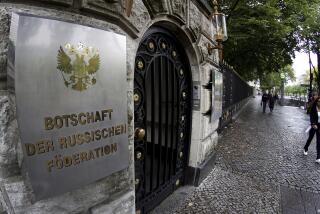6 Marine Guards at Leningrad Sent Home for Inquiry
WASHINGTON — All six Marine guards posted at the American Consulate in Leningrad are being returned home for questioning as part of the wide-ranging investigation into embassy security breaches, Pentagon and State Department officials said Friday.
The reassignment of the Leningrad sentries--the first such action outside Moscow--comes amid indications that at least one more Marine guard soon will be arrested in the expanding sex-for-secrets case.
“The end of this matter is not yet visible,” said a congressional source who has been kept abreast of the worldwide investigation by members of the Naval Investigative Service. The source, speaking on the condition that he would not be identified, said there is “a likelihood of several more arrests in the coming weeks.”
The rotation of the Marines in Leningrad, the Soviet Union’s second-largest city, follows the pattern announced by the Marine Corps last month in bringing home all 28 embassy guards in Moscow, where two guards have been charged with espionage after becoming sexually involved with Soviet women. In addition, the move was taken shortly after the arrest of a former guard in Leningrad who was accused of having spied in 1981 and 1982.
Headed for Quantico
Like the Moscow detachment, the Leningrad Marines will be brought to the Marine Corps base at Quantico, Va., south of Washington, where the security investigation is centered.
In a joint statement, the Defense and State departments said that these men “will be replaced by Marine security guards stationed in other posts of the world or the Marine security guard headquarters in Quantico. . . . The measure is precautionary in nature and is intended to facilitate the ongoing security investigation.”
A Pentagon official noted that none of the Marines in Leningrad would have information about Sgt. John Joseph Weirick, 26, who was accused of spying there, because sentries in such “hardship” posts are transferred every 12 to 15 months.
‘Hostile Intelligence Efforts’
But, like their colleagues in Moscow, the Leningrad contingent might be able to tell investigators about any “hostile intelligence efforts” directed at them, the official said.
Two Marines in Moscow, Sgt. Clayton J. Lonetree, 25, and Cpl. Arnold Bracy, 21, have been charged with espionage and conspiracy for allegedly allowing Soviet agents to enter sensitive areas of the U.S. Embassy in 1985 and 1986. Officials said that their action compromised secret codes and communications at the embassy and disclosed the identities of some Soviet citizens who were cooperating with the United States.
The alleged violations of Weirick, who is from Eureka, Calif., have not been detailed, pending the filing of formal charges against him. But officials said that he had “unreported contacts with Soviet citizens, including women.”
Another Marine, Staff Sgt. Robert S. Stufflebeam, a former Moscow guard supervisor, has been charged with improperly associating with Soviet women on three occasions in 1985 but has not been charged with espionage.
Soviets Display ‘Bugs’
In a related development Friday, Soviet diplomats in Washington invited reporters to their new $65-million embassy complex that is under construction to show them listening devices that they claimed American agents planted in the walls and ceilings in an espionage effort dating back to the 1970s.
The Soviets had mounted parts of these devices on display boards in the embassy auditorium. The diplomats, who frequently smiled and seemed to be enjoying the large press turnout, also escorted photographers to walls where some of the equipment was still embedded.
Evgeny Kutovoy, a Soviet security official, said the tour was arranged because “far-fetched allegations are being hurled at the Soviet side from Washington.” President Reagan has accused the Soviets of planting electronic “bugs” in the new American Embassy being constructed in Moscow and has said that the unfinished building may have to be destroyed.
Reagan Seeks Guarantee
Reagan has pledged that the Soviets will not be allowed to occupy their new structure in Washington until U.S. officials can guarantee the security of the embassy in Moscow.
Viacheslov Borovikov, another Soviet diplomat, told reporters that “we have no hostile intentions toward the United States of America,” adding: “We do not have many secrets in the United States.”
Even though all the “bugs” have not been removed from the building, Borovikov said, “we do not find it necessary to demolish our new embassy.”
More to Read
Sign up for Essential California
The most important California stories and recommendations in your inbox every morning.
You may occasionally receive promotional content from the Los Angeles Times.










